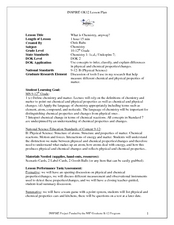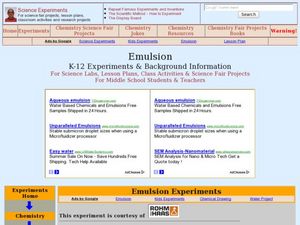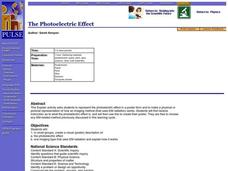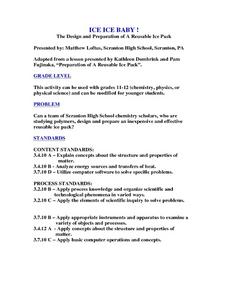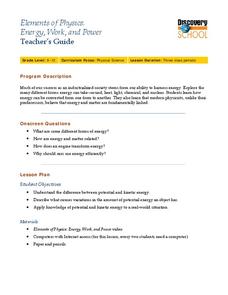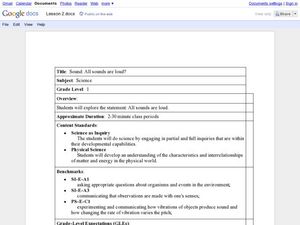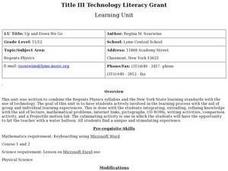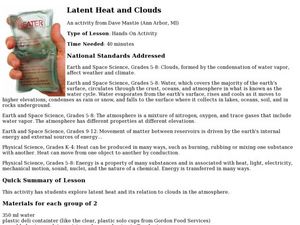Urbana School District
Thermodynamics
Entropy, it isn't what it used to be. Presentation includes kinetic-molecular theory, heat and internal energy, thermal equilibrium, temperature scales, laws of thermodynamics, entropy, latent heat of fusion, specific heat, calorimetry,...
Urbana School District
Gravitation
Introduction your class to famous astronomers with a presentation that also covers Newton's Laws of Gravitation, Kepler's Laws of Planetary Motion, both uniform and nonuniform gravitational fields, and how to calculate the gravitational...
American Museum of Natural History
See the Light
It's time to see the light! Scholars perform three different experiments with light to reveal properties using a great remote learning resource. The pupils see how light reflects from a surface and refracts through different materials....
American Museum of Natural History
Light Quest
Grab a partner and shed some light on light. A remote learning resource has scholars play a board game to answer trivia questions about light. They also read about how Einstein contributed to the understanding of light as both a wave and...
American Museum of Natural History
Make Your Own Einstein Stationary
No need to be an Einstein for this project! Clever crafters add their name, address, and country to three Einstein-themed templates and create their own, personalized stationary. A great way to stay connected while social distancing.
Curated OER
What Is Chemistry, Anyway?
Students differentiate physical and chemical change. For this chemistry lesson, students list examples of those changes. They apply what they learned in a Jeopardy style team game.
Curated OER
The Same But Different
Fourth graders identify the characteristics of a simple physical change. They describe objects by the properties of the materials from which they are made. Students discuss the different states of matter and their distinct physical...
Curated OER
The Penny Factory
Fourth graders identify the characteristics of a simple physical and chemical change. They describe objects by the properties of the materials from which they are made and separate or sort items using these properties. Students explain...
Curated OER
Sugar Bush Sap Production - Human Environmental Impact on Sap Sand
Eleventh graders compare the amount of sugar sand present in tree sap. In this environmental science lesson plan, 11th graders measure different tree circumference. They prepare a report and share findings in class.
Curated OER
Emulsions
Students identify the characteristics and composition of emulsions. In this chemistry lesson, students classify household products according to emulsion type. They explain how to make the best emulsion.
Curated OER
Chemical Composition of American Coins
High schoolers investigate the chemical composition of pennies dated 1983 or later. In this chemical composition of American coins lesson plan, students scratch the surface of the penny to expose the zinc core. They put the penny in...
Curated OER
The Photoelectric Effect
After some online instruction, chemistry aces use their creative abilities to produce a poster describing the photoelectric effect and one type of imaging technology that uses electromagnetic radiation. This simple, straightforward...
Curated OER
Friction: Friend or Foe?
Using a hands-on approach, learners explore the effect of friction on objects. Learners use toy cars, shoes, wood, metal, and more to experiment with the causes and effects of friction. Afterwards, they conduct experiments in which they...
Curated OER
Animal Coverings
Students compare and contrast the types of coverings found on animals. They identify a wide variety of animals in a museum room. They classify animals based on their coverings as well.
Curated OER
Solids, Liquids, and Gases
Students explore the three main forms of matter: solid, liquid, and gas. They examine concrete examples of each, using their five senses and "experimenting" to find differences in them. They find pictures of each, cut them out and past...
Curated OER
What Can We Do To Change These Materials
First graders perform experiments to investigate property changes that occur in materials or matter. In the science lab, they use heat to explore changes in rice, sand, gelatin, baking soda and more. Learners observe and record the...
Curated OER
Ice Ice Baby! The Design and Preparation of A Reusable Ice Pack
Students explore polymers by designing and preparing an inexpensive and effective reusable ice pack. They develop and test a design for a reusable ice pack in the science lab. Students apply chemical and physical properties of polymers...
Curated OER
Energy, Work and Power
Students examine the differences between potential and kinetic energy. For this physics lesson students view a video and apply what they learn about energy to apply it to real world situations.
Curated OER
Identifying Acids and Bases
Sixth graders observe the physical and chemical change that can occur in an acid and a base. In this acids and bases lesson plan, 6th graders use cabbage juice to identify, compare, and contrast acids and bases.
Curated OER
Spectral Surprise
Students create spectral colors. In this hands-on science lesson, students examine the electromagnetic spectrum as they follow steps to create a model that separates and displays light.
Curated OER
Sound: Are All Sounds Loud?
First graders explore physics by utilizing education software. In this sound properties lesson, 1st graders discuss the different sounds associated with different materials and perform an object dropping experiment in class. Students...
Curated OER
Up and Down We Go
Students explore physics concepts such as velocity, acceleration and speed to create a model of a safe roller coaster. They design and conduct a lab to demonstrate the properties of an object fired horizontally and at an angle.
Curated OER
Latent Heat and Clouds
Learners explore latent heat and how it relates to clouds in the atmosphere. In this earth science lesson students investigate how clouds are formed. Learners examine clouds and the water cycle.
Curated OER
Keeping Warm?
Fifth graders explore conductors and heat loss in different materials. In this Physical Science lesson plan, 5th graders will be measuring the temperature drop of water in four containers. The class will then discuss what an insulator,...







